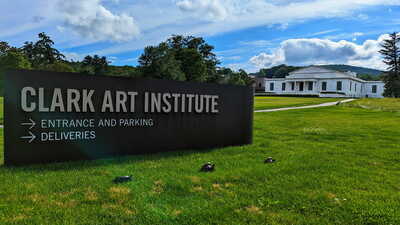Clark Names Recipient of Prize for Excellence in Arts Writing
WILLIAMSTOWN, Mass. — The Clark Art Institute has selected Bénédicte Savoy as the recipient of the 2024 Clark Prize for Excellence in Arts Writing.
Savoy is a professor of art history at Technische Universität in Berlin and is a noted expert on the provenance and repatriation of works of art, including looted art and other forms of illegally acquired cultural objects.
"The Clark Prize raises awareness of the importance of writing that bridges scholarly and popular interest and seeks to encourage support for clear and engaging writing that inspires readers to connect with the arts," said Olivier Meslay, the Hardymon Director of the Clark Art Institute. "Bénédicte Savoy's writing is on the cutting edge of one of the most important issues in art history and she has prolifically pursued a deep study of the very complex issue of provenance in her books and articles. The Institute is pleased to shine a spotlight on her work through the presentation of the Clark Prize."
Savoy has taught art history in French and German universities and colleges since 1997. In addition to her teaching career, Savoy is the author of more than 25 books and countless articles for international journals and magazines. Her book "Africa's Struggle for Its Art: History of a Postcolonial Defeat," originally published in 2021, has been reprinted in multiple languages and has strongly influenced the debate on restitution. Savoy has also curated or co-curated several museum exhibitions including Wilhelm and Alexander von Humboldt at Deutsches Historisches Museum in Berlin (2019-2020); Museum visions: The Competition to Expand the Berlin Museum Island in 1883/84 at Bauakademie Berlin (2015); The Humboldt Brothers: Europe of the Spirit at Observatoire de Paris (2014); and Napoleon and Europa: Dream and Trauma at the Art and Exhibition Hall of the Federal Republic of Germany, Bonn (2010).
In 2018, French President Emanuel Macron commissioned Savoy and Senegalese writer and academic Felwine Sarr to study and provide recommendations related to African cultural heritage objects held in French museum collections. The resulting report called for permanent repatriation of objects looted from African nations during the French colonial era. Savoy and Sarr were named as two of Time magazine's "100 Most Influential People of 2021" in recognition of their work. In 2022, Macron named Savoy as a chevalier in the Legion d'Honneur for her contributions to French art and culture.
"The rigorous debate spurred by this report has had a significant impact in the field of art history and in museums around the world. Bénédicte Savoy's writing is of importance and pertinence on this critical topic," said Meslay.
"I am extremely grateful to the Clark Prize jury for choosing to recognize my work and for demonstrating the importance of researching the provenance of beauty in our museums," said Savoy. "The question of restitution is and will remain one of the great global issues of the twenty-first century."
The members of the Clark Prize jury included Suzanne Hudson, professor of art history and fine arts at the University of Southern California; Asma Naeem, director of the Baltimore Museum of Art; Sebastian Smee, Pulitzer Prize-winning art critic for The Washington Post; Marc Gotlieb, Halvorsen Director of the Williams College Graduate Program in the History of Art; Esther Bell, the Clark's Deputy Director and Robert and Martha Berman Lipp Chief Curator; Caroline Fowler, the Starr Director of the Clark's Research and Academic Program; and Meslay.
An event honoring Savoy with the presentation of the Clark Prize will be held in the autumn of 2024.
The Clark Prize is funded by the Beinecke Family through the Prospect Hill Foundation. It is accompanied by a $25,000 honorarium and an award designed by Pritzker Prize-winning architect Tadao Ando, the designer of two buildings on the Clark's Williamstown campus.
Tags: Clark Art,

